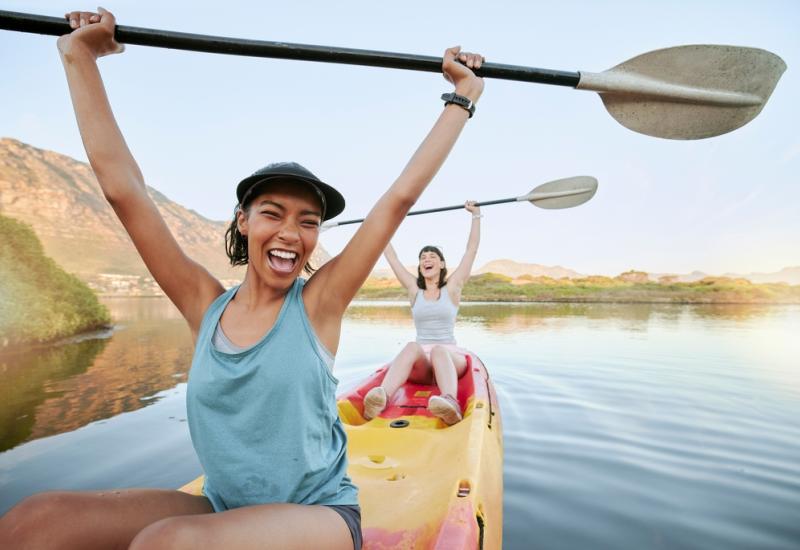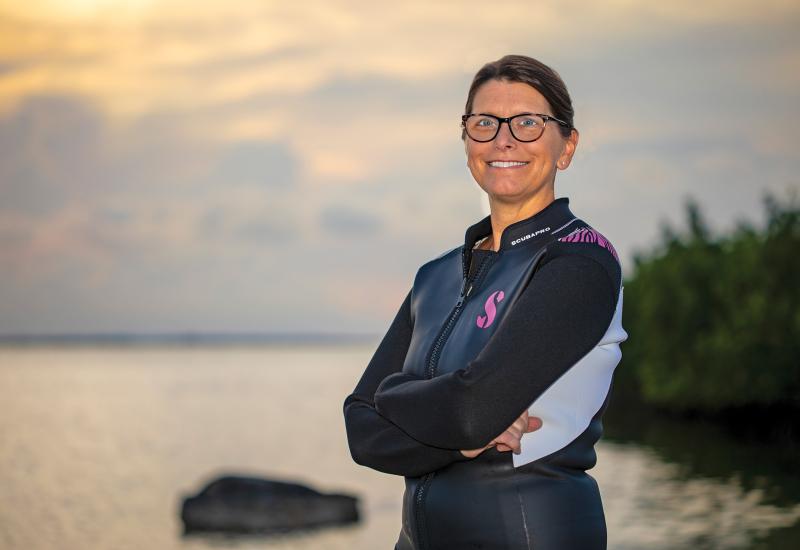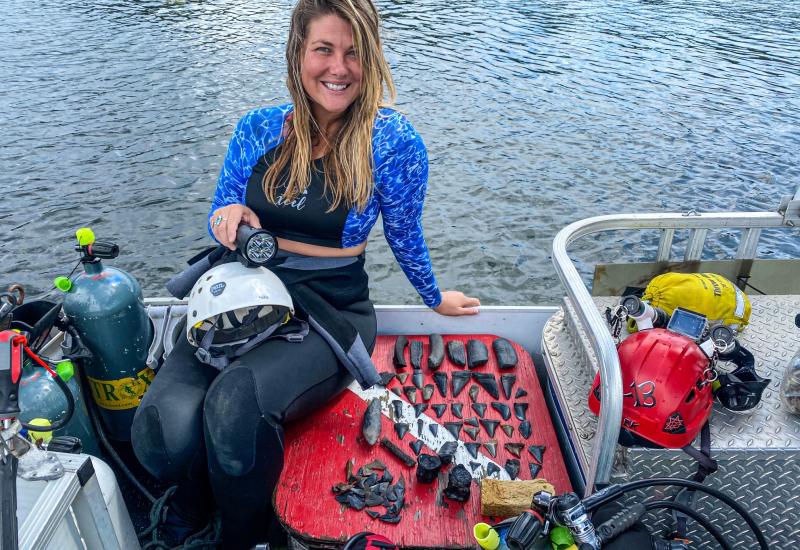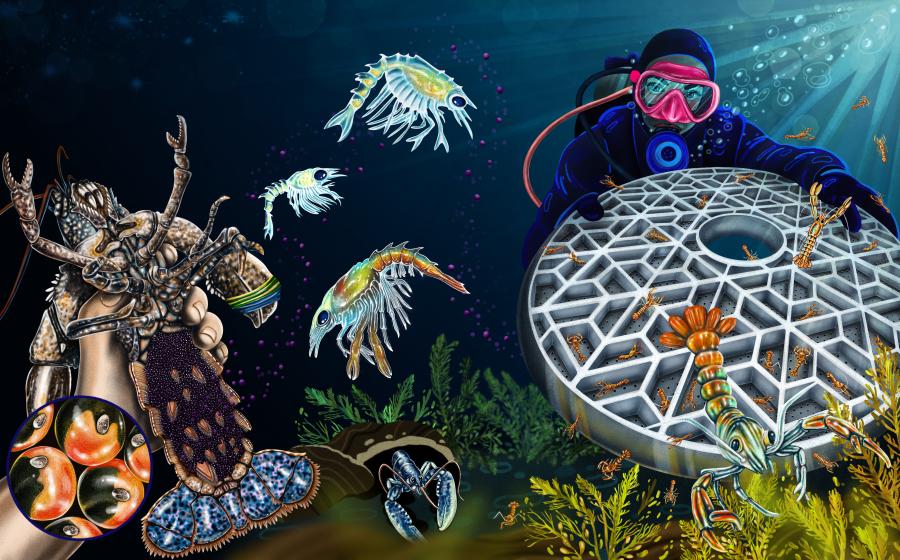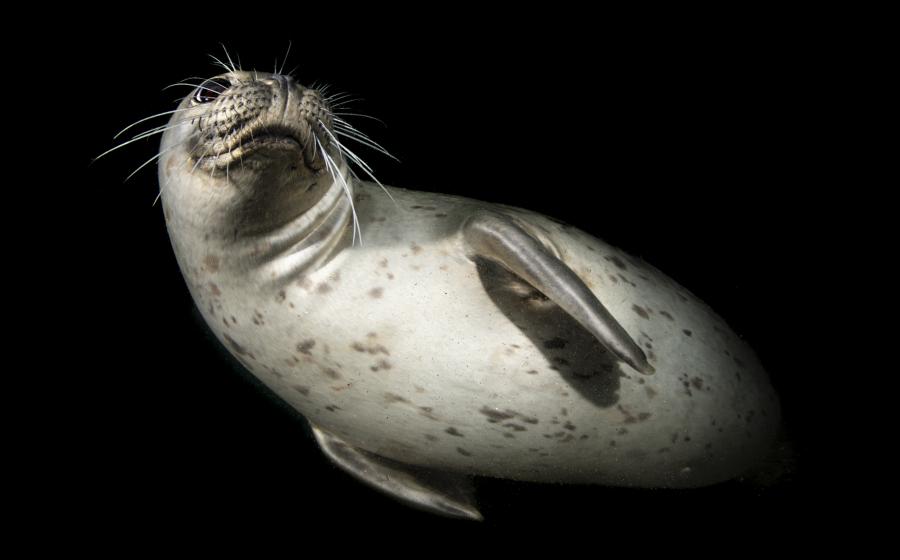Meet the Women Leading 'Mission: Iconic Reefs'
Two women at the forefront of marine conservation, Sarah Fangman and Jennifer Moore, are the co-leaders of Mission: Iconic Reefs, a NOAA-led and partner-driven effort to restore seven coral reef sites in Florida Keys National Marine Sanctuary. Read on to learn their inspiration for the project and how they face challenges as leaders.
Biographies
Sarah Fangman
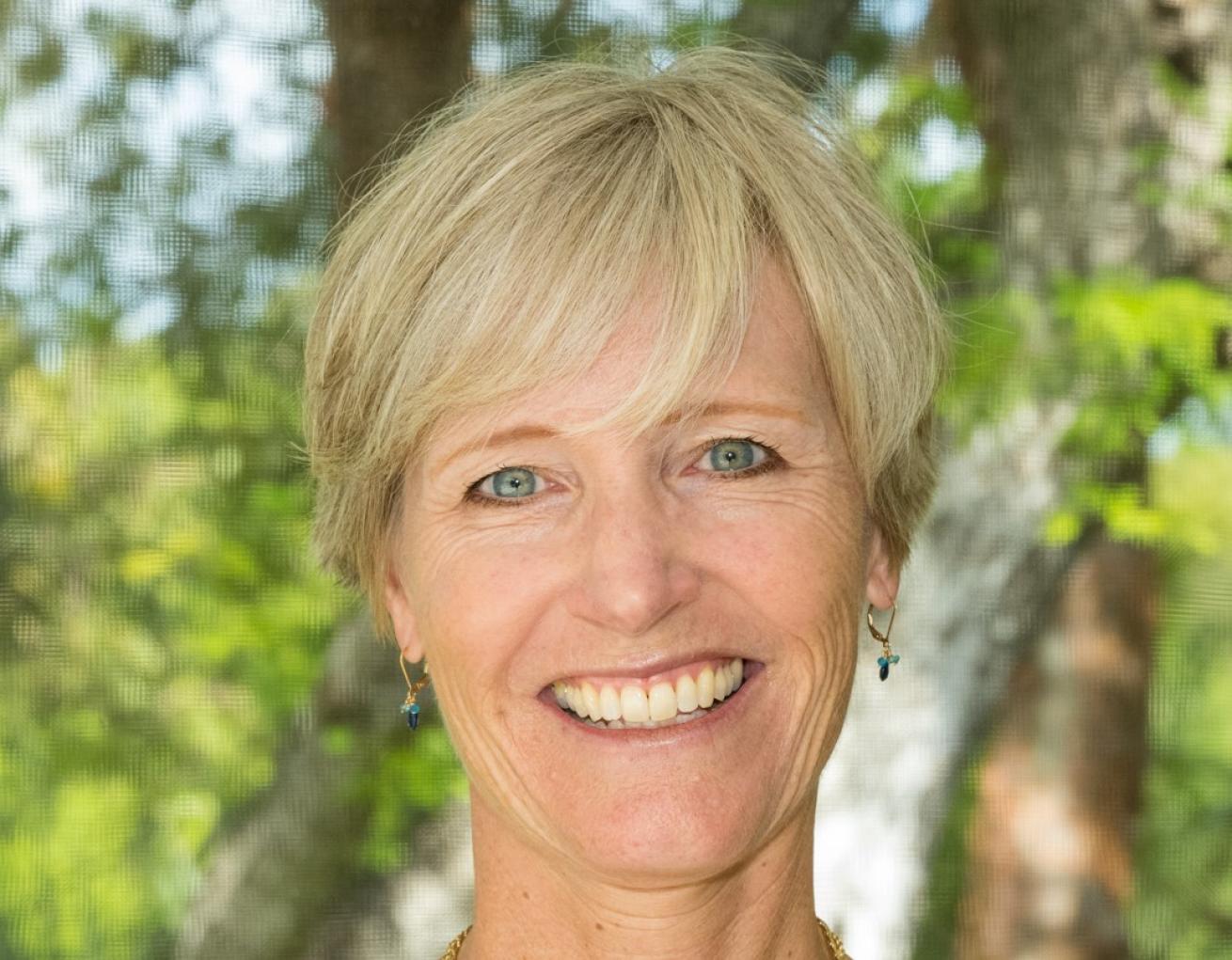
Courtesy of Sarah FangmanSarah Fangman, Superintendent of Florida Keys National Marine Sanctuary/Mission: Iconic Reefs Co-Lead
Sarah Fangman has more than three decades of experience working to protect our marine resources with NOAA’s Office of National Marine Sanctuaries. She has served as a U.S. Presidential Management Fellow at NOAA’s Northwest Fisheries Science Center in Seattle, WA and the Marine Mammal Health and Stranding Response program in Washington, D.C, as well as the Channel Islands National Marine Sanctuary science coordinator. She next took her advocacy to management roles, leading the sanctuary systems of the Southeast, Gulf of Mexico, and Caribbean regions, where she conducted more than 400 dives in the Keys alone. She was then appointed superintendent of Gray’s Reef National Marine Sanctuary in Georgia.
Since 2017, Fangman has been the superintendent of Florida Keys National Marine Sanctuary, where she co-leads Mission: Iconic Reefs and has witnessed the massive initiative evolve from initial discussions to the full-scale, multi-collaborative restoration effort that it is today. “So many people quickly wanted to get involved and support Mission: Iconic Reefs, confirming it was worth doing,” she says. “It was the ultimate validation. People want to be part of it.”
Jennifer Moore
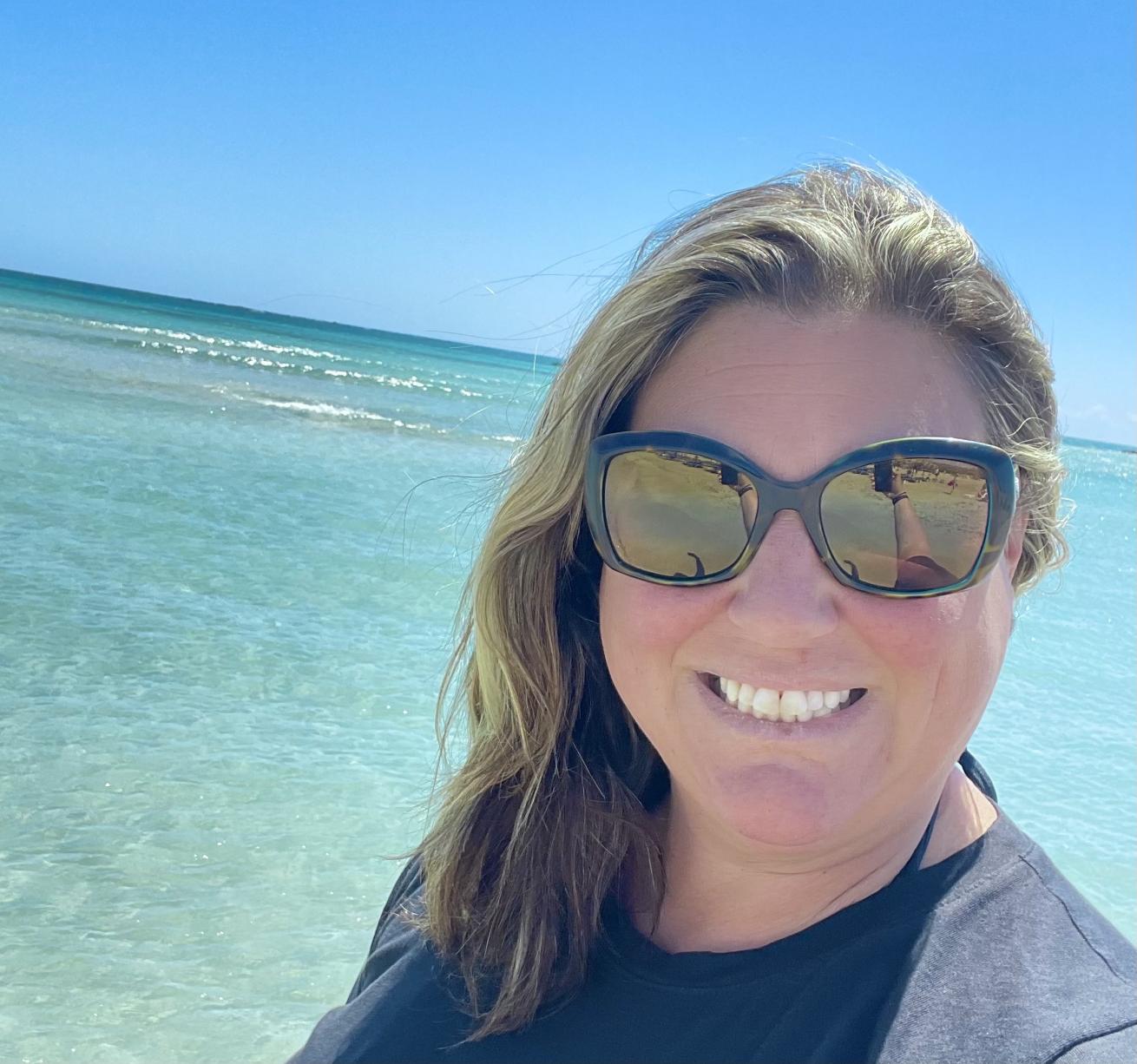
Courtesy of Jennifer MooreJennifer Moore, NOAA Fisheries ESA-listed Coral Recovery Coordinator and Mission: Iconic Reefs Co-lead
Originally from New Jersey, Jennifer Moore fell in love with the ocean while visiting the shore each summer. She attended Seacamp in the Florida Keys as a teenager, to which she attributes her early desire to dedicate her life to the ocean. She received her bachelor’s degree in marine biology from Boston University and her master’s degree in biological oceanography from the University of South Florida, where she conducted research in Belize and found her passion for coral reefs.
Jennifer has worked on the conservation of Caribbean corals her entire career. She joined NOAA in 2003 and listed the first-ever corals as threatened under the Endangered Species Act (ESA) in 2006. Moore has also authored several ESA regulations and led the drafting of the Recovery Plan for Elkhorn Coral (Acropora palmata) and Staghorn Coral (A. cervicornis). Currently, she focuses on the recovery of the threatened Caribbean corals through conservation initiatives such as Mission: Iconic Reefs with Fangman and the Florida Coral Rescue Program.
Looking to the past and future of female leadership
Have you ever faced hesitation from your male counterparts?
Fangman: Yes. I can remember it very clearly—early in my career. In fact, during my first full time position with NOAA, I was chief scientist for a multi-week project that involved nine separate research cruises on our research vessel. I was the youngest, I was female, and the other scientists were more senior, but I was designated the chief scientist. The vessel captain was also a male. He would inevitably go to the male science team members to ask, “what are we doing next, where are we going next?” completely looking past me. I wondered, “why does he keep asking these other guys what we're doing and where we’re going, when I’m the chief scientist and responsible for making those decisions?” So I decided to just focus on demonstrating my knowledge and expertise. [The captain] eventually came around and began asking me for direction over the course of the mission. I didn’t have to confront him. Should I have? I don't know. I was young and didn’t have any experience with being dismissed or overlooked in that way. I just kept doing my job and he came to understand, “oh, she knows what she’s doing”. So, it all worked out. I still consider that to be a wonderful experience and I enjoyed working with him very much. It was definitely eye opening.
Related Reading: Celebrating Womens Dive Day With Legend Sally Wahrmann
Do you have any mottos that help you in your continued leadership position, especially as a woman?
Moore: Working in the sciences at NOAA, particularly the fisheries field, it is very male dominated. However, in the coral world, we are actually much more female dominated. I would say 80% of my colleagues are women. So I've always felt surrounded by a lot of strong female leaders and that it was a good space for me to operate in. I don’t know if I have an actual motto or mantra, but I do feel empowered by the fact that there is this great support system and I don’t feel like I'm the lone female in the room in a leadership role.
Fangman: I don’t explicitly have a motto or a mantra, but I can tell you that throughout my career, I have found my motivation in what we are trying to accomplish and achieve. When I keep my eyes on the prize, that drives me forward no matter what the challenge or complication.
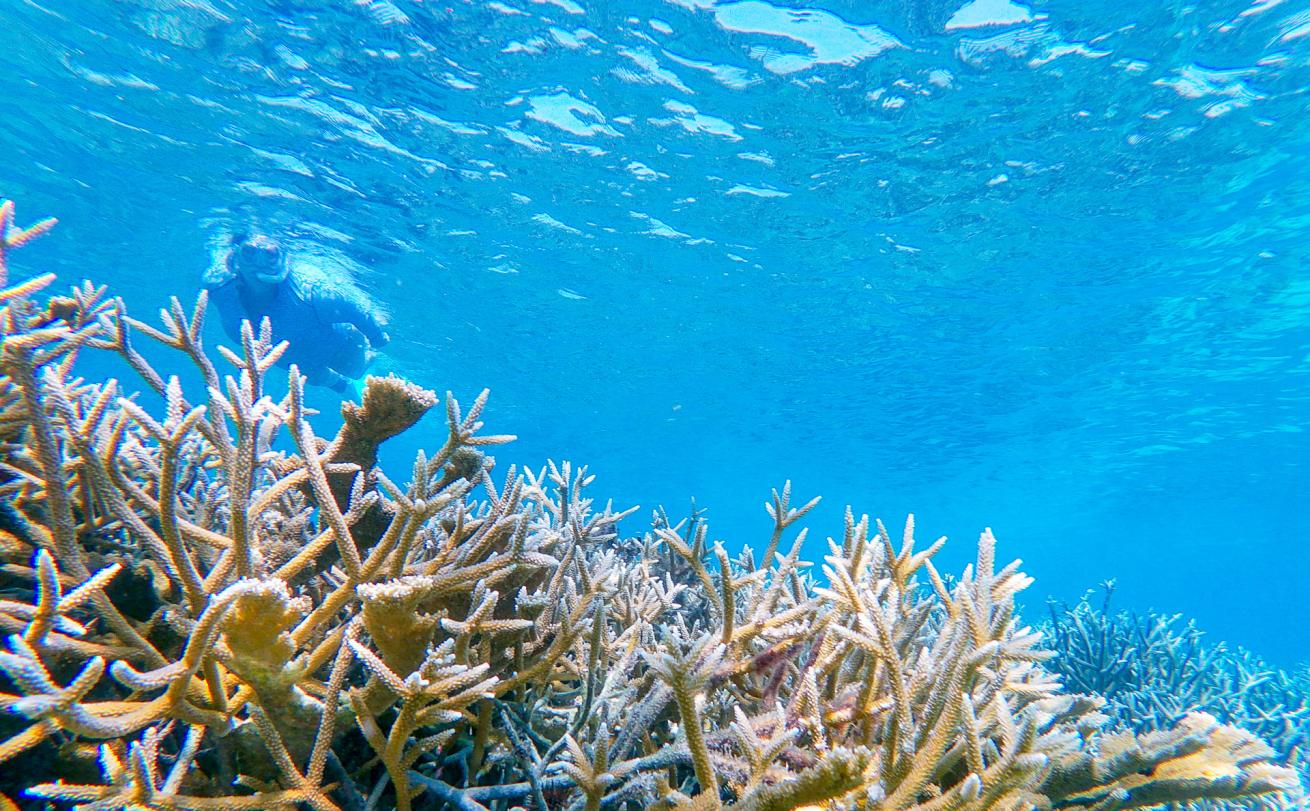
Tom MooreJennifer Moore snorkeling over a shallow coral reef in Belize.
Have you ever experienced imposter syndrome?
Fangman: Of course! I have experienced imposter syndrome all the time and still do. “Is it good enough? Is it enough? Am I enough?” I always push myself, “I should be able to do better.” That’s not uncommon in many fields, but in marine conservation and national resource protection in particular, the challenges we face are daunting. So, one person’s actions by most measures are not enough. And that's what imposter syndrome is—not feeling like you’re enough. It is inherent in what we do because the hills we try to climb are so steep and so high. I don’t know how you can do this work without having those feelings of “I’m not enough, I’m not accomplishing enough, I’m not achieving enough, I’m not making enough of a difference.” My constant challenge is to figure out how we set that stuff aside and harness the energy that would otherwise be spent doubting, questioning, or feeling somehow not enough—and put it to purpose. Imagine what we could do!
Moore: Every single day. Perhaps imposter syndrome and self doubt is something young girls and women are taught—at least in my generation. It’s crazy because no one ever said to me, “oh, you can’t do that because you’re a girl.” When I was growing up I was told, “you can do anything, you can become president of the United States.” And yet, we still have not had a woman as president. I know my capabilities, I know who I am, and I’m confident in what I do—but I also can’t believe that I am the one person in the entire federal government who does what I do with Mission: Iconic Reefs. If I view it from an outsider’s perspective, it would seem like there are so many other people, but it's just me filling that federal expert role in this particular capacity. I definitely have moments when I second guess myself. It's a weird sort of dichotomy of self doubt, but really knowing that I shouldn’t have that self doubt.
Ken NedimyerSarah Fangman checking on a Mission: Iconic Reefs coral nursery in Florida Keys National Marine Sanctuary.
As a child, who were your female role models?
Fangman: Well, they weren’t in the field that I am now pursuing because I didn’t know I wanted to be a marine biologist when I was growing up. I grew up far from the ocean in Minnesota, so I didn’t have a lot of marine biologists to emulate. That said, I had strong women. The first one is my mother. She was very determined, she was curious, she was humble, and she had a really charming way about her. Her influence was naturally the strongest because she raised me. But she also surrounded herself with strong and independent women, so I was fortunate to have a lot of them around in the form of her friends. I took inspiration from a lot of different women who were just charting their own path and unafraid to do what they thought was right.
Moore: I had a strong support network growing up. Later on, I was inspired by my graduate advisor at USF. She was a trailblazer for women’s equal rights. She actually sued the university in the late 80s or early 90s because she was not being paid the same as her male counterparts. I think there was only one other woman working at the university at the time, so she was really up against a mountain, and she won. That was super inspiring to me. I graduated 22 years ago, and she’s still a professor there. She just has so much passion, particularly in mentoring female students. So I try to do that too when I have opportunities to mentor others. It’s very important to me to foster the next generation.
How would you describe your leadership style? Has it changed since you first started working at NOAA?
Moore: I think with experience, age, and maturity, you learn a lot more. I have a strong personality, so earlier in my career, I was more like a boulder, with the mindset of “I’m going to do it, I’m going to just keep forging forward.” I think over time I really learned that you have to figure out how to work the system and maneuver. Ultimately it all comes down to relationships. Working with others and forming strong partnerships is how good work gets done. The thing that I focus on the most is developing professional friendships and relationships. You need people to trust you and you need people to want to work with you.
Fangman: Absolutely it has changed. I will confess that I did not necessarily aspire to be a leader. In fact, when I had a position early in my career, my mother would often ask, “well, what are you going to do next?” She was challenging me to grow and take on more responsibility. My thought at the time was, “I’m perfectly happy doing what I’m doing now and don’t aspire to other roles and responsibilities!” That was many jobs ago.
Ultimately for me, it has been a course that is driven by what I want to accomplish in the work, not who I want to be in a title. I’ve been drawn to positions where I can make a difference. It just so happens that many of those positions come with leadership responsibilities. I didn’t aspire to be any kind of leader, I aspired to get something done.
Related Reading: The Importance of Women in Diving and Conservation
Do you have any advice for women starting out in the marine conservation field?
Moore: Tenacity. Don’t give up, and don’t take the first ‘no’ as the final answer right away. If you’ve gotten that far and have gotten the interview, you have the credentials, you’ve done the work, and you’re qualified, so it’s almost assumed that you're going to be good at your job, right? In my experience, what puts somebody over the top as a candidate is being able to have personal conversations, and having higher emotional intelligence. You have to focus on the soft skills of conversation, building relationships and trust. If there’s a lot of people out there trying to get into the field and trying to get a limited number of jobs, that one little personality trait that makes you stand out is what ultimately could make the difference. So, just be persistent, be yourself, and follow through.
Fangman: We need all the help we can get. That’s not advice, it’s a plea for help. We have our share of challenges and we need creative, committed, dedicated people to help us make progress.
How integral is scuba diving to your job? What level of dive training do you have and how do you keep your skills sharp for work?
Fangman: These days diving is something I do less often, only because I’m typically busy with meetings and travel. But whenever I have the chance, I like to get in the water and see the sanctuary through my mask! I remember fondly those days in my work life when I was diving regularly, typically for the purpose of science and data collection. When diving was a central part of my job, I maintained my NOAA Divemaster certification, and completed my Diving Medical Technician certification as well.
Moore: Earlier in my career when I was conducting research, scuba diving was a larger part of my job. I was certified at the age of 16 at Seacamp. I now hold Advanced and Rescue diver certifications. My current role does not require scuba, but I still love to dive coral reefs for recreation and continuing education.

